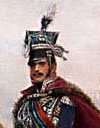The Russians, meanwhile, seemed in little hurry to get to serious grips with their adversaries. A great deal of skirmishing and minor actions took place at various points along the column, but nothing really serious happened until the 17th. By that date Napoleon had been at Krasnoe for two days, waiting for his extended column to close up. He was not altogether satisfied with the situation, however, as is shown by the dispatch of two regiments of teh Young Guard to aid Eugene's IVth Corps, which was held up by Davidovitch and Nikulina for much of the 16th before finding a way round the block through Jomina. Indeed, his anxiety to ensure that the main road should remain open induced Napoleon to order and attack against Kutusov by the Guard on the morning of the 17th. At first he thought to entrust this operation to General Rapp, but then changed his mind and placed General Roguet of the Middle Guard in command. The operation was a complete success. The southbound French columns (16,000 strong) caught Kutusov completely unawares, so accustomed had he become to the idea of a passive French opponent. The Russian partisan leader Davydov, fancifully recorded that "The Guard with Napoleon passed through our Cossacks like a hundred gun ship through a fishing fleet," and in no time the Russian commander in chief was ordering his 35,000 men to retreat south. The Russians subsequently tried to misrepresent the outcome of the action, claiming that "Bonaparte commanded in person and made the most vigorous exertions, but in vain; he was obliged to flee the field of battle." But this was flagrant propaganda. It was Kutusov who had very much the worst of the encounter.
The French Grand Armee was now down to 45,000 effectives
This action - known as the Battle of Krasnoe - is of significance for two reasons. First, it reveals the degree of moral ascendancy retained by Napoleon: his very name could clearly still strike terror into the hearts of his opponents; secondly, it proved the correctness of the decision not to send in the Imperial Guard at the later stages of Borodino, for had this formation been severely mauled near the River Moskva, it is unlikely that it could have pulled off this notable coup some eight weeks later. Strategically the French attack at Krasnoe proved fully effective. It ensured that the road to the west remained open, allowed the greater part of the army (less Ney) to rejoin the Emperor by the evening of the 17th, and made the enemy warier than ever.
~ D. Chandler, The Campaigns of Napoleon, p. 828-829























































No comments:
Post a Comment